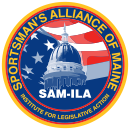Testimony Neither For Nor Against
LD 128, An Act to Prohibit Foraging on Private Land without Permission
Before the Joint Standing Committee on Agriculture, Conservation and Forestry
Presented by David Trahan, Executive Director, Sportsman’s Alliance of Maine
January 31, 2017
Senator Davis, Representative Dunphy, distinguished members of the Agriculture, Conservation and Forestry Committee, my name is David Trahan and I am representing the Sportsman’s Alliance of Maine testifying neither for nor against LD 128, An Act to Prohibit Foraging on Private Land without Permission.
The relationship between landowner and user has matured into a delicate balance of landowner tolerance and user respect. At times, user abuse, whether dumping trash, tearing up fields or complete disregard has led to new laws or more “Posted” signs. Because this relationship is so important and is vital to user groups like ours, we handle proposed laws like LD 128 very carefully.
If LD 128 passes, foraging for wild raspberries, blackberries, dandelion greens, wild cranberries and countless other wild edibles will change dramatically. The provisions of LD 128 would require written landowner permission or a bill of sale to forage or transport any wild food in any amount. Punishment for violating this new provision is a class E crime punishable by a $1000.00 fine and up to 6 months in jail. Penalties increase significantly as the value of the wild edible increases. We have concerns that if this law passes and someone possessing any outdoor edible in any situation they face inspection, search and possible prosecution for not providing a bill of sale or written permission, instead of the crime of theft.
In all cases, if you have a firearm or dangerous weapon while foraging or transporting without written permission or a bill of sale the penalty automatically jumps to a felony. This provision is not practical and extreme, at best.
Maine law facilitates the public use of private land. If land is not posted, it is assumed that the public has a right to use it under the doctrine of “implied access”, it doesn’t mean you have the right to harvest plants like outdoor edibles that the courts have deemed the property of the landowner; as a result, the unauthorized taking of any private property is already against the law and can be prosecuted as theft under Title 17 A, Chapter 15, Subsection 353. Recognizing that it is difficult for law enforcement to prove theft of wild trees and their parts when there are no witnesses, they made it easier for enforcement by adding a requirement that anyone possessing or transporting these natural resources carry proof of origin in the form of a bill of sale or written landowner permission. This change created a new crime, not of theft, but, being in possession of a naturally growing resource without “proper documentation”. All edibles would be added to this mandatory documentation requirement
The proposed new law specifically says “State Police, County Sheriffs, municipal law enforcement officers, State Forest Rangers and Game Wardens are authorized to make inspections, investigations and arrests.” I will explain why this provision is one every sportsman and woman should care about.
First, this bill is coming from the agriculture and landowner community and is under the jurisdiction of the Agriculture, Conservation and Forestry Committee, yet this group has no effective enforcement branch for such a law. Forest rangers do not have law enforcement training and are not armed like Game Wardens. When enforcing laws that include crimes like class B felonies, dangerous and sometimes violent encounters will happen. Because Game Wardens are those most likely to encounter land users in the woods as they protect our wildlife, and are specially trained for such potentially dangerous situations, they will likely be tasked with the lion’s share of the new “outdoor edible” enforcement.
The bigger and more dramatic policy change being proposed by LD 128 is, do Maine people want to add enforcement and management of all the wild edible plants to the already resource strapped Department of Inland Fisheries and Wildlife; and further, do sportsmen and women want to pay for it with hunting and fishing license fees?
We have nearly a million acres of unposted public land, federal land, countless non-resident landowners and land management companies with out of state addresses and no phone numbers. We don’t believe a bill of sale or written permission is practical in any of these cases, so the net result if this law passes is millions of acres of land once foraged without incident will now be off limits for that purpose.
Proponents of LD 128 say they are more concerned with the commercial harvest of fiddleheads and mushrooms. Fiddleheads can be harvested for about three weeks in May, wouldn’t it make more sense for the landowners who don’t want pickers on their property to temporarily post, “Foraging by Permission only” or for the committee to craft a policy that targets commercial outdoor edible sales.
If a new law is needed to address the concerns of landowners we believe it should be narrowly written addressing the commercial harvesting of wild edibles. In the case of all other outdoor edibles, landowners can use existing theft laws to file complaints on a case by case basis. The real lesson here is, this is an educational opportunity. The lesson-as a land user it is important to ask permission first and for the landowner to make it clear what types of activities they allow and which they don’t. The advice I will give my members-written permission is best.
Thank you
